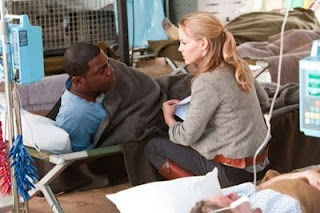James Willetts is back to pick over the bones of the latest episode of Miracle Day. Warning: may contain traces of Buffy.
So that was it. Torchwood’s big twist was that there was no twist. The concentration camps are just concentration camps and Oswald Danes really isn’t a nice man after all. Yes. It’s not exactly The Sixth Sense. Hell, it’s not even The Village, but Torchwood should really be applauded for its enthusiastic willingness to play it straight.
The only problem is, no one seems to have told the show runners, who breathlessly announced that this was the point at which PhiCorp’s true intentions would be revealed. Except, as it turned out, they were the same intentions that were revealed last week.
I’m still waiting on this show because I honestly can’t believe that having spent so long building up to concentration camps and the forced categorisation of people in a thoroughly unsubtle parallel of Nazi Germany, the big reveal was that everything we suspected was, in fact, true.
It’s just a little underwhelming, is all.
I mean, they’re burning people alive, and I think we can all get on board with the fact that this isn’t nice behaviour. But a lot of these people probably could do with being burnt actually. I mean, if they’re trapped in terrible, unrelenting pain, in a body that will never recover, and should by all rights be dead, should they not be put out of their misery? There are larger moral questions that Torchwood essentially tells us not to ask because only the evil people ask such questions.
After all, maybe they should be discussing whether these people can even be considered to be ‘alive’ or ‘human’ any more, bearing in mind that at least some of them are detached heads, or cubes of flesh and metal. At this point you would think the first thing to do would be to reach a consensus on just who actually has any claim to life. The categories don’t do that, they decide how sickly you are, not whether you should still exist.
In spite of that, this is a much better episode, in which the team actually interact with the ongoing plot and drive the situation forward. I’m still of the opinion that this is not a good programme, in main because the Miracle – the thing that we’re specifically told is the vehicle and focus of the plot – has been largely ignored. Torchwood has not shown much gumption in investigating what’s going on, most of their effort going toward stopping PhiCorp.
This is resolved a little in this episode as Gwen flies back to Cardiff and Jack, Rex, Esther and Dr Juarez infiltrate an American aid camp. The two attempts to get into the transatlantic camps are successful, until things go wrong and Dr Juarez gets herself shot and incinerated.
In any other programme that wouldn’t be the shocking twist ending. Frankly I expect two or three characters to die in any programme and Dr Juarez is just an expository character, there to provide an explanation of what’s going on in the hospital. With the focus shifting to the concentration camps her hospital themed antics are no longer required. The best deaths are those where I care for the character, even if they were not necessarily a main cast member. Jenny Calendar from Season 2 of Buffy is a good example – a background character whose death was unexpected, poignant and affecting. In comparison Dr Juarez may as well have been a crash test dummy going up in flames.
In other news, Esther heads further and further into irrelevancy. Even the fact that she knows she is irrelevant makes her less and less interesting. If she were merely incompetent it may be forgivable, but to actually recognise her own uselessness and just stick around so she can be Jack’s gal-pal is a little bit irritating.
Jack, meanwhile, manages to prove that, just because you’re an immortal alien with thousands of years of life experience, doesn’t mean you can be a good judge of character. I don’t think anyone expected him to convince Danes to shop PhiCorp in at this point, but his utter ineffectiveness, despite every attempt to induce some tension into the script, was funny more than anything else. Poison Ivy and Oswald Danes continue to be the only two characters consistently elevating themselves above their characterisation.
Whilst it was nice to see the return of Rhys, his position as ‘guy who can drive stuff’ doesn’t really seem like much of a role. His interaction with Gwen proves that it’s possible to write interesting character interactions. It’s just such a shame that it hasn’t seeped across to America yet.
So, over to you. Has Miracle Day finally turned a corner, or would you rather be watching Buffy? Leave a comment and let us know. And don’t miss our podcast commentary for Episode 6: ‘The Middle Men’, available straight after the UK broadcast this Thursday!





Just been catching up with the episodes having been away and yes this was better but the ending makes no sense whatsoever.
They have just made the show's premise from no-one can die to it's just really really hard to kill someone. In the first episode we were shown a suicide bomber in bits and the (not The) doctor cut the a vein or artery to his head, yet he lived.
Whether they realised it or not they are assuming people are more than just their bodies: mind body dualism. Thus the incinerated are living in the dust particles that are left and thus in theory it would be possible to put their bodies back together. Even if they couldn't the miracle means they have just changed their form of being.
This would then lead to the obvious question what is life which it fails to even mention in passing.
Great review James anyway. This really annoyed me.